We may not have the course you’re looking for. If you enquire or give us a call on +44 1344 203 999 and speak to our training experts, we may still be able to help with your training requirements.
Training Outcomes Within Your Budget!
We ensure quality, budget-alignment, and timely delivery by our expert instructors.
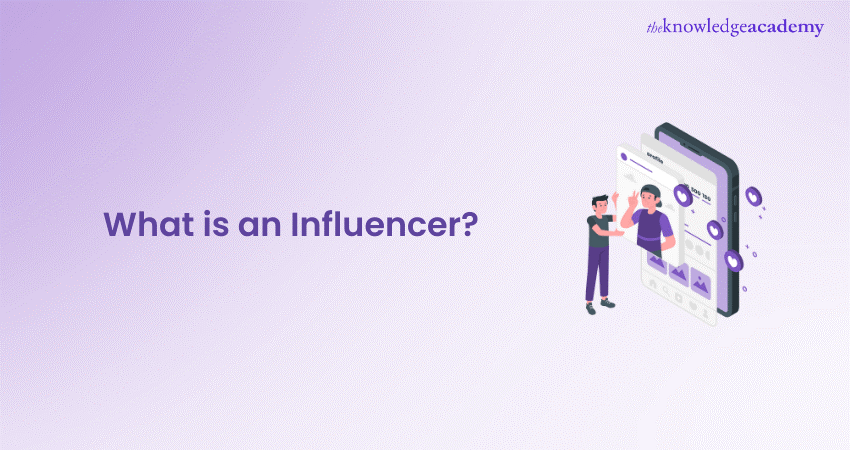
Picture a captivating blend of trendsetters, content creators, and community builders. That’s Influencers for you. But What is an Influencer exactly? Influencers have the unique ability to enchant audiences across various Social Media platforms. They are modern-day storytellers, using their digital prowess to shape trends and spark conversations that resonate throughout the online world.
With their knack for creating engaging content and connecting with people, Influencers play a pivotal role in today's digital landscape. They inspire, entertain, and inform, making them key players in the ever-evolving realm of Social Media. Dive in to learn about What is an Influencer and the skills required to become one.
Table of Contents
1) What is an Influencer?
2) Types of Influencers
3) The Role of Influencers in Marketing
4) How to Become an Influencer?
5) Benefits and Drawbacks of Becoming an Influencer on Social Media
6) How to Find Influencers?
7) Conclusion
What is an Influencer?
An Influencer is an individual who can impact the purchasing decisions of others due to their authority, expertise, position, or connection with their audience. They typically have a dedicated following within a specific niche and actively engage with their community. Brands often collaborate with Influencers to achieve their marketing goals.
Influencers can be found across different platforms, such as Social Media (Instagram, YouTube, TikTok), blogs, podcasts, and even in traditional media. Their influence can extend beyond just product recommendations; they can shape trends, promote causes, and drive conversations on relevant topics.
Note: Keep in mind that an Influencer's effectiveness depends on factors like authenticity, relevance, and the quality of their content.
Types of Influencers
Let's examine different types of Influencers, delving deeper into their characteristics, typical content, and roles in Influencer marketing:
1) By Follower Count

Nano-Influencers (1K - 10K followers)
a) Characteristics: Close-knit, highly engaged communities with a personal touch.
b) Content: Personal stories, product reviews, daily experiences.
c) Marketing Role: Ideal for niche products or local businesses seeking authentic endorsements and high engagement.
Micro-Influencers (10K - 100K followers)
a) Characteristics: Specialists in their niches with loyal, active followers.
b) Content: Detailed reviews, tutorials, and niche-specific advice.
c) Marketing Role: Effective for targeted campaigns focused on engagement and conversions within specific niches.
Mid-Tier Influencers (100K - 500K followers)
a) Characteristics: Balanced reach and engagement.
b) Content: Mix of personal insights and professional collaborations.
c) Marketing Role: Suitable for broader campaigns, balancing reach and engagement.
Macro-Influencers (500K - 1M followers)
a) Characteristics: Significant reach with polished, professional content.
b) Content: High-quality photos, videos, brand collaborations.
c) Marketing Role: Best for brand awareness and reaching large audiences.
Mega-Influencers (1M+ followers)
a) Characteristics: Often celebrities or widely recognised personalities with vast followings.
b) Content: High-production value content, brand endorsements.
c) Marketing Role: Ideal for mass awareness campaigns and major product launches.
2) By Niche
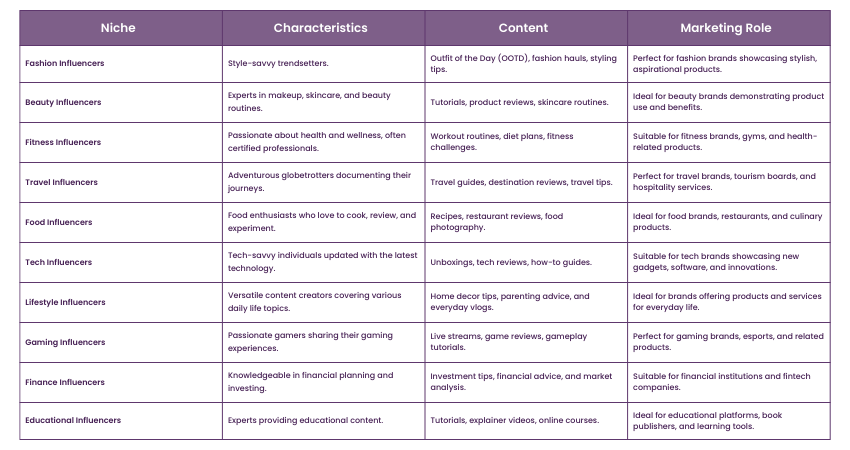
Fashion Influencers
a) Characteristics: Style-savvy trendsetters.
b) Content: Outfit of the Day (OOTD), fashion hauls, styling tips.
c) Marketing Role: Perfect for fashion brands showcasing stylish, aspirational products.
Beauty Influencers
a) Characteristics: Experts in makeup, skincare, and beauty routines.
b) Content: Tutorials, product reviews, skincare routines.
c) Marketing Role: Ideal for beauty brands demonstrating product use and benefits.
Fitness Influencers
a) Characteristics: Passionate about health and wellness, often certified professionals.
b) Content: Workout routines, diet plans, fitness challenges.
c) Marketing Role: Suitable for fitness brands, gyms, and health-related products.
Travel Influencers
a) Characteristics: Adventurous globetrotters documenting their journeys.
b) Content: Travel guides, destination reviews, travel tips.
c) Marketing Role: Perfect for travel brands, tourism boards, and hospitality services.
Food Influencers
a) Characteristics: Food enthusiasts who love to cook, review, and experiment.
b) Content: Recipes, restaurant reviews, food photography.
c) Marketing Role: Ideal for food brands, restaurants, and culinary products.
Tech Influencers
a) Characteristics: Tech-savvy individuals updated with the latest technology.
b) Content: Unboxings, tech reviews, how-to guides.
c) Marketing Role: Suitable for tech brands showcasing new gadgets, software, and innovations.
Lifestyle Influencers
a) Characteristics: Versatile content creators covering various daily life topics.
b) Content: Home decor tips, parenting advice, everyday vlogs.
c) Marketing Role: Ideal for brands offering products and services for everyday life.
Gaming Influencers
1) Characteristics: Passionate gamers sharing their gaming experiences.
2) Content: Live streams, game reviews, gameplay tutorials.
3) Marketing Role: Perfect for gaming brands, esports, and related products.
Finance Influencers
a) Characteristics: Knowledgeable in financial planning and investing.
b) Content: Investment tips, financial advice, market analysis.
c) Marketing Role: Suitable for financial institutions and fintech companies.
Educational Influencers
a. Characteristics: Experts providing educational content.
b. Content: Tutorials, explainer videos, online courses.
c. Marketing Role: Ideal for educational platforms, book publishers, and learning tools.
3) By Platform
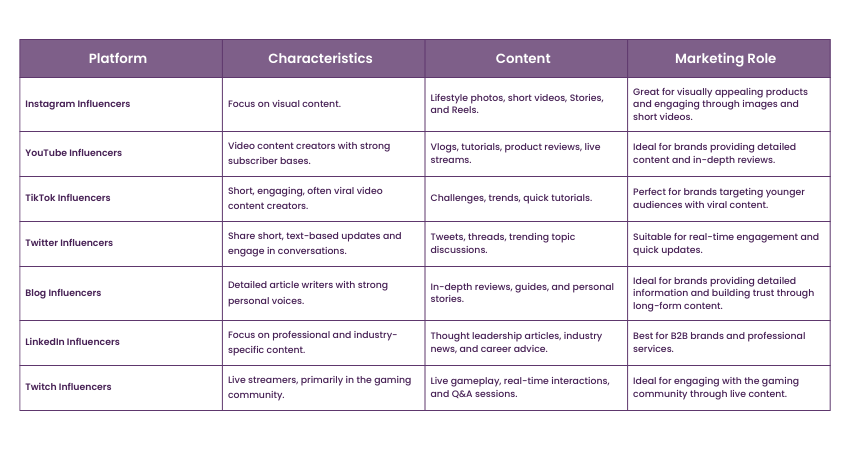
Instagram Influencers
a) Characteristics: Focus on visual content.
b) Content: Lifestyle photos, short videos, Stories, and Reels.
c) Marketing Role: Great for visually appealing products and engaging through images and short videos.
YouTube Influencers
a) Characteristics: Video content creators with strong subscriber bases.
b) Content: Vlogs, tutorials, product reviews, live streams.
c) Marketing Role: Ideal for brands providing detailed content and in-depth reviews.
TikTok Influencers
a) Characteristics: Short, engaging, often viral video content creators.
b) Content: Challenges, trends, quick tutorials.
c) Marketing Role: Perfect for brands targeting younger audiences with viral content.
Twitter Influencers
a) Characteristics: Share short, text-based updates and engage in conversations.
b) Content: Tweets, threads, trending topic discussions.
c) Marketing Role: Suitable for real-time engagement and quick updates.
Blog Influencers
a) Characteristics: Detailed article writers with strong personal voices.
b) Content: In-depth reviews, guides, and personal stories.
c) Marketing Role: Ideal for brands providing detailed information and building trust through long-form content.
LinkedIn Influencers
a) Characteristics: Focus on professional and industry-specific content.
b) Content: Thought leadership articles, industry news, career advice.
c) Marketing Role: Best for B2B brands and professional services.
Twitch Influencers
a) Characteristics: Live streamers, primarily in the gaming community.
b) Content: Live gameplay, real-time interactions, Q&A sessions.
c) Marketing Role: Ideal for engaging with the gaming community through live content.
Level up your Social Media Presence today with our Influencer Marketing Course – Sign up now!
The Role of Influencers in Marketing
Influencers are crucial for building great marketing strategies. They provide brands with an opportunity to genuinely and efficiently engage with their intended audience. Through partnering with Influencers, brands can leverage their audiences and trustworthiness to increase awareness, interaction, and sales. Let’s see some key contributions of Influencers:
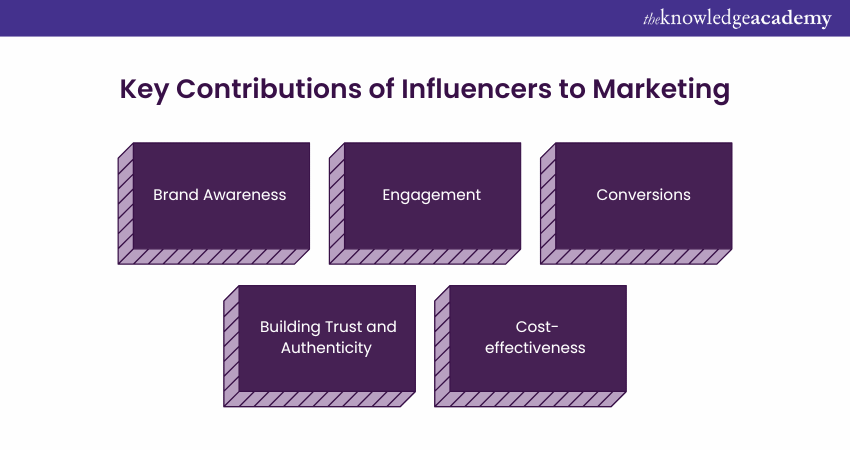
1) Brand Awareness
Influencers significantly boost brand visibility by introducing their followers to various brands and products. When they share content featuring a brand, it allows the brand to connect with new audiences, particularly if the Influencer’s followers align with the brand’s target market.
Moreover, Influencers enhance brand recognition among consumers. Studies show that individuals are more apt to recall a brand if it receives support from a reputable Influencer. This impact has the potential to create lasting benefits for brands even long after the initial exposure.
2) Engagement
Influencers excel at fostering engagement with brands. Their supporters are typically very engaged and frequently willing to interact with the content they share. This high level of involvement results in higher likes, comments, shares, and other interactions with content related to the brand.
In addition, Influencers promote a sense of community for a brand. Through engaging in conversations and exchanging ideas with their audience regarding brands, they establish a community of dedicated supporters who are more inclined to promote the brand and spread their favourable experiences to others.
3) Conversions
Influencers can generate substantial conversions. Their support can influence their audience's buying choices, resulting in higher sales and income for the company. The impact goes beyond buying products, as Influencers can encourage sign-ups, downloads, and website visits.
Influencers can effectively steer their followers towards desired actions by including clear calls to action in their promotions. Influencers are essential in any marketing strategy because they can turn audience engagement into tangible outcomes.
4) Building Trust and Authenticity
One main advantage of Influencer marketing is the trust Influencers have built with their followers. Followers frequently perceive Influencers as relatable figures, making their endorsements more authentic than traditional advertising. This genuine nature encourages stronger bonds, increasing the chances of consumer engagement.
5) Cost-effectiveness
Collaborating with Influencers can also serve as a budget-friendly marketing tactic, especially for brands facing financial limitations. Teaming up with micro and nano Influencers typically leads to increased engagement rates compared to larger Influencers because these smaller Content Creators have closer connections with their followers. This can result in improved ROI and more impactful campaigns.
Learn strategies to increase brand visibility and reach a larger audience with our Social Media Marketing Course – join today!
How to Become an Influencer?
Becoming an Influencer requires a mix of passion, consistency, and strategic planning. Just having a big follower count isn't sufficient; you must nurture an active and loyal fan base. Below are the crucial steps to position yourself as a credible Influencer:
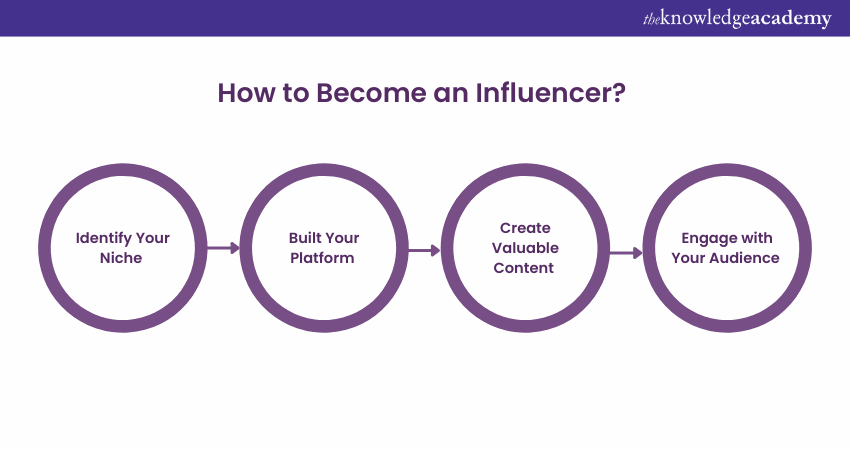
1) Identify Your Niche
Start by choosing a niche - something you are enthusiastic and knowledgeable about. This will define your target audience and is essential for drawing in genuine followers. So, carefully select your niche, as it will determine your content and engagement tactics.
2) Built Your Platform
Once you have identified your specific area of focus, it is time to establish your platform. This might be a blog, YouTube channel, Instagram profile, or any other Social Media platform. Your website is where you will share content and engage with your followers.
Choose a platform that fits your specific market well and connects with your target audience. For instance, if fashion is your primary focus, using the Instagram platform could be the ideal choice.
3) Create Valuable Content
Creating valuable content is essential for drawing in and keeping followers. Your content should provide your audience with advantages, whether it be entertainment, education, or inspiration.
Consistency is essential. Post content regularly while maintaining a cohesive theme or style. This reliability fosters trust with your audience and motivates them to return for more content.
4) Engage with Your Audience
Interacting with your audience is essential for building loyalty. Engage with comments, request feedback, and express gratitude towards your followers. Being actively involved helps establish unity surrounding your brand and shows your audience they are appreciated.
Furthermore, establish connections with other Influencers within your industry. These connections can broaden your influence and generate opportunities for collaboration
Master the principles of Digital Marketing with our Digital Marketing Course - register now!
Benefits and Drawbacks of Becoming an Influencer on Social Media
Let’s dive into the pros and cons of being a Social Media Influencer:
1) Benefits
a) Remote Work: As an Influencer, you have the flexibility to work from anywhere – whether it’s your home, a local library, or even while travelling. You set your own hours, allowing you to create content and manage other tasks on your terms.
b) PR Packages: Influencers can set their rates based on different pricing models. Charging per piece of content, offering packages, or bundling services can help boost income and increase exposure across various social platforms.
c) Control Over Content: Influencers create content aligned with their passions. You have full control over what you share with your audience, fostering a sense of community.
d) Creative Autonomy: Even when collaborating with brands, Influencers often maintain creative control. By leveraging their expertise and understanding of their audience, they create authentic content that resonates.
2) Drawbacks
a) Inconsistent Work: Establishing a steady income stream as an Influencer can be challenging. Pitching brands and securing compensated projects takes effort, and income may fluctuate.
b) Audience Expectations: Building and maintaining an engaged audience requires consistent effort. Influencers must create content regularly, respond to comments, and stay relevant.
c) Privacy Concerns: Being in the public eye means sacrificing some privacy. Influencers share personal aspects of their lives, which can lead to scrutiny, criticism, and even online harassment.
d) Comparison and Competition: Social Media platforms foster a culture of comparison. Influencers often compare their follower counts, engagement rates, and aesthetics with others.
How to Find Influencers?
We’ve thoroughly covered What is an Influencer, its types and how you can become one. Now, let’s move on to find Influencers on platforms like Instagram, LinkedIn, YouTube, etc.
1) Leverage Social Media Search Tools
Discovering Influencers typically begins on Social Media, where a Creator's influence is closely tied to their online visibility. You can use features such as keyword search, hashtags, and advanced tools to find Influencers in your area of interest.
2) Finding Influencers on Instagram
Instagram is a great tool for discovering Influencers because of its strong search features. Begin by selecting the 'Explore' page by tapping on the magnifying glass icon at the top of the screen. Ensure you are logged in with your brand account to view customised recommendations tailored to your profile.
You can also input relevant keywords in the search bar at the top. Utilise specialised terminology in the industry and select from sections such as popular posts, profiles, hashtags, and places to discover potential Influencers to track. After you start following a Creator, Instagram will recommend other profiles for you to discover.
3) Finding Influencers on YouTube
YouTube is ideal for finding Influencers who focus on product reviews or tutorials. Similar to Instagram, YouTube also features an 'Explore' section that allows users to discover popular content within their specific interests or industry. You have the option to either explore categories or select 'Trending' to see popular videos. You can also enter industry-specific keywords in the search bar to discover popular videos.
4) Finding Influencers on TikTok
TikTok is ideal for finding creators because its viral aspect makes discovering Influencers easy. The 'Discover' page operates in the same way as that of Instagram's 'Explore' page. Click on the magnifying glass located in the top right corner of your 'For You' page (FYP) to see trending hashtags and popular content.
You may also explore keywords associated with your brand and apply filters for prominent users, videos, and hashtags to locate people in your field. Moreover, TikTok's Creator Marketplace offers the opportunity to locate and work with Influencers while monitoring your campaigns.
5) Finding Influencers on LinkedIn
While LinkedIn may not be the initial platform you think of when looking for Influencers, it can still be a useful tool. You have the option to look for people whose profession is listed as "Influencer," "Content Creator," or "Blogger." Upon reaching the platform, input these terms into the search bar and then refine the results by selecting 'People.'
To find Influencers that are relevant, refine your search by industry and other demographics. After you find a potential collaborator, reach out through a direct message to establish a connection. Even if they have no interest in partnering with you, they could still connect you with someone who is interested.
Conclusion
Influencers are the heartbeat of digital culture. They inspire, entertain, and connect us. So next time you scroll through your feed, remember: behind every post lies What is an Influencer shaping our world. These digital creators are more than just Social Media personalities; they are key players in the ongoing evolution of digital culture, impacting how we communicate, consume, and connect in an increasingly digitalised world.
Gain a solid understanding of the principles of Digital Marketing and influence mass with our Digital Marketing Course – join today!
Frequently Asked Questions

Instagram remains a hotspot, but TikTok and YouTube are rising stars. You can select the platform based on your niche and audience type.

Influencers can make money through sponsored posts, affiliate marketing, brand collaborations, and selling digital products.

The Knowledge Academy takes global learning to new heights, offering over 30,000 online courses across 490+ locations in 220 countries. This expansive reach ensures accessibility and convenience for learners worldwide.
Alongside our diverse Online Course Catalogue, encompassing 17 major categories, we go the extra mile by providing a plethora of free educational Online Resources like News updates, Blogs, videos, webinars, and interview questions. Tailoring learning experiences further, professionals can maximise value with customisable Course Bundles of TKA.

The Knowledge Academy’s Knowledge Pass, a prepaid voucher, adds another layer of flexibility, allowing course bookings over a 12-month period. Join us on a journey where education knows no bounds.

The Knowledge Academy offers various Digital Marketing Courses, including the Influencer Marketing Course, Pinterest Marketing Course, and Display Advertising Course. These courses cater to different skill levels, providing comprehensive insights into Operations Management.
Our Digital Marketing Blogs cover a range of topics related to Influencer Marketing, offering valuable resources, best practices, and industry insights. Whether you are a beginner or looking to advance your Social Media skills, The Knowledge Academy's diverse courses and informative blogs have got you covered.
Upcoming Digital Marketing Resources Batches & Dates
Date
 Social Media Marketing Course
Social Media Marketing Course
Fri 17th Jan 2025
Fri 21st Mar 2025
Fri 16th May 2025
Fri 18th Jul 2025
Fri 19th Sep 2025
Fri 21st Nov 2025







 Top Rated Course
Top Rated Course



 If you wish to make any changes to your course, please
If you wish to make any changes to your course, please


